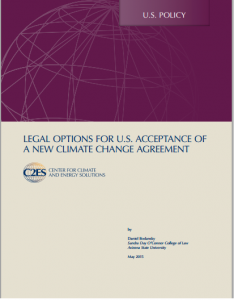Full Title: Legal Options for U.S. Acceptance of a New Climate Change Agreement
Author(s): Daniel Bodansky and Sandra Day O’Connor
Publisher(s): Center for Climate and Energy Solutions (C2ES)
Publication Date: May 1, 2015
Full Text: Download Resource
Description (excerpt):
The success of ongoing negotiations to establish a new global climate change agreement depends heavily on the agreement’s acceptance by the world’s major economies, including the United States. The new agreement is being negotiated under the United Nations Framework Convention on Climate Change (UNFCCC), a treaty with 195 parties that was ratified by the United States in 1992 with the advice and consent of the U.S. Senate. U.S. acceptance of the new agreement may or may not require legislative approval, depending on its specific contents.
U.S. law recognizes several routes for entering into international agreements. The most commonly known, under Article II of the Constitution, requires advice and consent by two-thirds of the Senate. In practice, however, the United States has accepted the vast majority of the international agreements to which it is a party through other procedures. These include congressional-executive agreements, which are approved by both houses of Congress, and presidential-executive agreements, which are approved solely by the president.
The President would be on relatively firm legal ground accepting a new climate agreement with legal force, without submitting it to the Senate or Congress for approval, to the extent it is procedurally oriented, could be implemented on the basis of existing law, and is aimed at implementing or elaborating the UNFCCC. On the other hand, if the new agreement establishes legally binding emissions limits or new legally binding financial commitments, this would weigh in favor of seeking Senate or congressional approval. However, the exact scope of the President’s legal authority to conclude international agreements is uncertain, and the President’s decision will likely rest also on political and prudential considerations.
